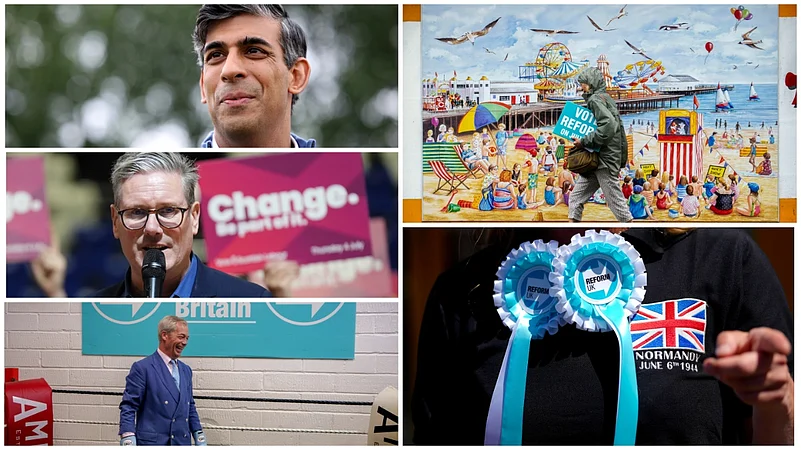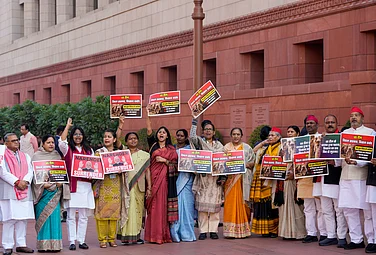The 2024 UK general elections is taking place on Thursday, July 4, with 650 parliamentary seats up in the House of Commons. The polling began at 7 am (local time) and will conclude at 10 pm.
The dissolution of the UK Parliament took place on May 30, 2024, putting an end to all the business in the lower House and the House of Lords.
Notably, all the nominations paper from the candidates were handed in by June 7. Meanwhile, all the eligible voters were required to register themselves by midnight of June 18 to be able to cast their votes in what has been deemed a "historic" election.
UK ELECTIONS 2024 | KEY FACTS
UK Elections 2024: The elections, on Thursday (July 4), is being held across 650 parliamentary constituencies. Polling began at 7 am (local time) and will conclude at 10 pm. Notably, to form the government, a party must secure 326 seats. After the polls are closed, the next eye will be at the exit polls, which will provide a fair idea of what could be expected for the government as the counting of votes will begin across the UK.
Key Candidates: While Britain's first Indian-origin Prime Minister and Conservation Party leader Rishi Sunak is aiming for a return to the post, former chief prosecutor for England and Wales, Sir Keir Starmer -- from the Labour Party -- has turned out to be a tough competition in the running for the polls. Other key candidates in the fray, include Liberal Democrats leader Ed Davey, Reform UK party leader Nigel Farage, Scottish National Party leader John Swinney and others.
Key Issues: Britons, with a population of over 67 million people, has several issues to consider before casting its vote. The primary concerns for the UK population are the economy, immigration, healthcare, environment and climate change.
Opinion Poll Projections: Major pollsters in the UK projected a "landslide victory" for the Labour Party and its leader Sir Keir Starmer, with the party expected to return to power with "99 seats more than 1997". The Labour Party was projected to win around 425 of the 650 seats in the House of Commons. On the other hand, Rishi Sunak and his Conservative Party were projected to record a "historic defeat". Starmer and his party's win in the UK elections would mean the end of the 14-year rule of the Conservative Party.
What Rishi Sunak Said: In his final message before the elections on Thursday, Conservative Party leader Rishi Sunak urged people to stop the Labour Party's "supermajority", as most of the incumbent Conservatives seemed to have conceded defeat. The 44-year-old Sunak said that the only way to stop the Labour from putting up people's taxes was by voting for Conservative.
What Sir Keir Starmer Said: As the high-voltage campaigning for the UK general elections were wrapped up on Wednesday, Labour Party leader Sir Keir Starmer said the claims of Conservative Party that his party is on course for a massive victory in the elections amounted to "voter suppression". He said that Tory cabinet minister Mel Stride's conceding defeat by saying so was just a way to try and get people to stay home, instead of going out and vote. Starmer also reacted to the poll projections and said, "People are saying the polls predict the future – they don't predict the future, every single vote counts, every single vote has to be earned… It isn't 'job done'."
A Little About The Parliament: The lower House of the Parliament -- the House of Commons -- has 650 seats, each representing a district of the UK. Meanwhile, the leader of the party with the majority votes -- alone or in coalition -- become the Prime Minister and leads the government. Then, the unelected upper House -- House of Lords -- scrutinises the legislations passed by the Commons. It consists of peers appointed for life by political parties, along with some judges, bishops and hereditary nobles.
2019 UK Elections: In the 2019 general elections, the incumbent Conservatives bagged a total of 365 seats and Boris Johnson became the Prime Minister. However, in October 2019, the Parliament were dissolved and Johnson again emerged victorious in the snap elections. After a Covid-19 crisi and "Partygate", Johnson resigned and was replaced by Liz Truss. Later, Truss also resigned from the post, with Indian-origin Rishi Sunak succeeding her as the PM.
(With inputs from agencies)



























